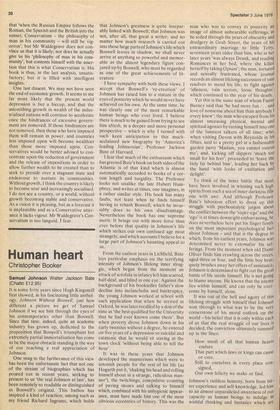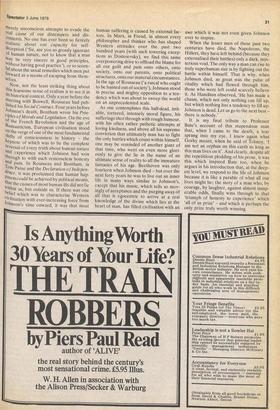Human heart
Christopher Booker
Samuel Johnson Walter Jackson Bate (Chatto £12.95) It is some forty years since Hugh Kingsmill first showed, in his fascinating little anthology, Johnson Without Boswell, just how different a picture we get of * Samuel Johnson if we see him through the eyes of his contemporaries other than Boswell. Since that time, indeed, quite an academic industry has grown up, dedicated to the proposition that Boswell's triumphant but extremely partial immortalisation has come to he the major obstacle standing in the way of our reaching a real appreciation of Johnson.
One snag to the furtherance of this view has been the unfortunate fact that not one of the stream of biographies which has poured out in recent years, seeking to present to us 'the real Johnson at last', has been remotely so readable or distinguished as Boswell's original. This bathos has inspired a kind of reaction, among such as my friend Richard Ingrams, which holds that Johnson's greatness is quite inseparably linked with Boswell; that Johnson was not, after all, that great a writer; and no matter how much research is carried out into those large parts of Johnson's life which Boswell leaves in shadow, we shall never arrive at anything so powerful and memorable as the almost legendary figure conjured up by Boswell, who must be regarded as one of the great achievements of literature.
I have sympathy with both these views. I accept that Boswell's 're-creation' of Johnson has raised him to a stature in the eyes of posterity which he would never have achieved on his own. At the same time, he was clearly one of the most remarkable human beings who ever lived. I believe there is much to be gained from trying to see him afresh, in a deeper and more personal perspective — which is why I turned with such keen anticipation to this muchacclaimed new biography by 'America's leading Johnsonian', Professor Jackson Bate of Harvard.
I fear that much of the enthusiasm which has greeted Bate's book on both sides of the Atlantic is of that kind which is almost automatically accorded to books of a certain length and turgidity. The Professor looks not unalike the late Hubert Humphrey, and writes at times, one imagines, in a rather similar style. His book has many faults, not least when he finds himself having to rehash Boswell, which he invariably does to his own disadvantage. Nevertheless the book has one supreme merit. It brings out with more force than ever before that quality in Johnson's life which strikes our own confused age most strangely, and which accounts I believe for a large part of Johnson's haunting appeal to us.
From the earliest years in Lichfield, Bate lays particular emphasis on the terrifying intensity of Johnson's lifelong inner struggle, which began from the moment an attack of scrofula in infancy left him scarred, half-deaf, and blind in one eye. Against the background of his bookseller father's slow decline into melancholia and bankruptcy, the young Johnson worked at school with such application that when he arrived at Oxford, he was later recalled by a don of the time as 'the best qualified for the University that he had ever known come there'. But when poverty drove Johnson down in his early twenties without a degree, he entered on five years of a depression so suicidal and catatonic that he would sit staring at the town clock 'without being able to tell the hour'.
It was in these years that Johnson developed the mannerisms which were to astonish people for the rest of his life (as Hogarth put it, 'shaking his head and rolling himself about in a strange, ridiculous man ner'), the twitchings, compulsive counting of paving stones and talking to himself which, combined with his unhygienic appearance, must have made him one of the most obvious eccentrics of history. This was the man who was to convey to posterity an image of almost unbearable sufferings, as he toiled through the years of obscurity and drudgery in Grub Street, the years of his extraordinary marriage to little Tetty, seventeen years older than him, who in her later years 'was always Drunk, and reading Romances in her bed, where she killed herself by taking Opium'; the man, tortured and sexually frustrated, whose journal records an almost lifelong succession of vain resolves to mend his life, to fight against 'idleness, vain terrors, loose thoughts', which continued to the year of his death.
Yet this is the same man of whom FannY Burney said that 'he had more fun ; . . and love of nonsense about him than anybody.1 every knew'; the man who escaped from his almost unceasing physical, mental and spiritual agonies by turning himself into one of the funniest talkers of all time; who, when visiting Devon with Reynolds in his fifties, said to a pretty girl at a fashionable garden party 'Madam, you cannot outrun me', and, kicking off slippers 'much too small for his feet', proceeded to 'leave the lady far behind him', leading her back bY the hand 'with looks of exultation and delight'.
To think of the inner battle that must have been involved in winning such high spirits from such a sea of inner darkness fills one with awe. And although Professor Bate's laborious effort to dress up this struggle with psychoanalytic jargon about the conflict between the 'super-ego' and the 'ego' is at times downright embarrassing, he does nevertheless here put his finger firmlY on the most important psychological fact about Johnson — and that is the degree to which, from his earliest years, Johnson was determined never to externalise his sufferings. From the moment when old Dame Oliver finds him crawling across the street, aged three or four, and the little boy brusquely brushes away her offers of assistance, Johnson is determined to fight out the great battle of life inside himself. He is not going to blame anyone. He knows that the enemY lies within himself, and can only be overcome by himself, alone.
It was out of the hell and agony of this lifelong struggle with himself that Johnsoll won through to what was to be the very cornerstone of his moral outlook on the world — his belief that it is only within each of us that the real struggle of our lives Is decided, the conviction ultimately summed up in the lines: How small of all that human hearts endure That part which laws or kings can cause or cure.
Still to ourselves in every place coo. signed,
Our own felicity we make or find.
Johnson's ruthless honesty, born from bitter experience and self-knowledge, led him to an almost unparalleled awareness of our capacity as human beings to indulge in wishful thinking and fantasies which are
Merely unconscious attempts to evade the real cause of our distempers and dis contents. No one has ever been so fiercely realistic about our capacity for selfdeception ('Sir, are you so grossly ignorant of human nature, not to know that a man May be very sincere in good principles, Without having good practice'), or so scornful about the usual remedies which men put forward as a means of escaping from themselves,
Now, not the least striking thing about this fearsome sense of realism is to see it in its historical context. Only a year before the Meeting with Boswell, Rousseau had published his Social Contract. Four years before Johnson's death, Bentham wrote his Principles of Morals and Legislation. On the eve of the French Revolution and the age of Romanticism, European civilisation stood on the verge of one of the most fundamental Shifts of consciousness in history — the keynote of which was to be the complete reversal of every truth about human nature and experience which Johnson had won through to with such remorseless honesty and pain. In Rousseau and Bentham, in 1nm Paine and the Declaration of Independence , it was proclaimed that human hapPiriesscou/d be achieved by political means, that the causes of most human ills did not lie Within us, but outside us. If there was one belief which was to characterise Western eiVilisation with ever-increasing force from Johnson's time onward, it was that most
human suffering is caused by external factors. In Marx, in Freud, in almost every philosopher and thinker who has shaped Western attitudes over the past two hundred years (with such towering exceptions as Dostoievsky), we find this same overpowering driveto offload the blame for all our guilt and pain onto others, onto society, onto our parents, onto political structures, onto our material circumstances. In the age of Rousseau ea rascal who ought to be hunted out of society'), Johnson stood in precise and mighty opposition to a tendency which was about to sweep the world on an unprecedented scale.
As one contemplates this half-dead, irritable, tortured, intensely moral figure, his sufferings shot through with rough humour, with his often rather pathetic attempts at loving kindness, and above all his supreme conviction that ultimately man has to fight the only battles which count within himself, one may be reminded of another giant of that time, who went on even more gloriously to give the lie in the name of an ultimate sense of reality to all the immature fantasies of his age. Beethoven was only fourteen when Johnson died — but over the next forty years he was to live out an inner life in many ways similar to Johnson's, except that his music, which tells so movingly of acceptance and the purging away of all that is egocentric to arrive at a real knowledge of the divine which lies at the heart of man, has filled civilisation with an awe which it was not even given Johnson ever to inspire.
When the lesser men of these past two centuries have died, the Napoleons, the Hitlers, they have left behind (because they externalised their battles) only a dark, mysterious void. The only way a man can rise to truly superhuman size is by fighting out the battle within himself. That is why, when Johnson died, so great was the pulse of vitality which had flowed through him, those who were left could scarcely believe it. As Hamilton observed, 'He has made a chasm, which not only nothing can fill up, but which nothing has a tendency to fill up. Johnson is dead. Let us go to the next best — there is nobody.'
It is my final tribute to Professor Bate's account of this stupendous man that, when I came to the death, a tear sprang into my eye. I knew again what Gorky meant, when he said of Tolstoy, 'I am not an orphan on this earth so long as this man lives on it'. And clearly, despite all the repetitious plodding of his prose, it was this which inspired Bate too, when he argues in his introduction that, at the deepest level, we respond to the life of Johnson because it is like a parable of what all our lives might be; the story of a man who, by courage, by laughter, against almost insuperable odds, finally wins through to that 'triumph of honesty to experience' which 'all of us prize' — and which is perhaps the only prize truly worth winning.



































 Previous page
Previous page